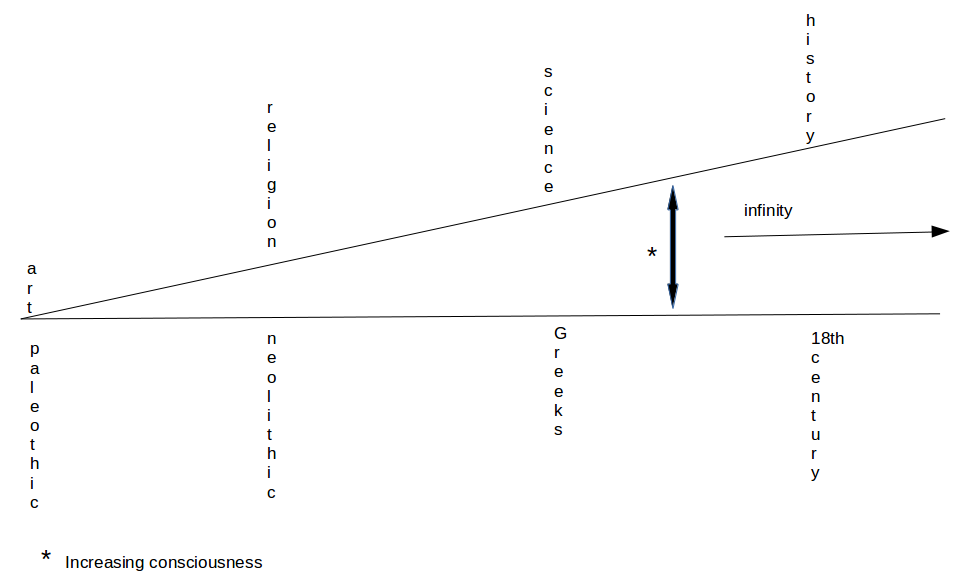There is nothing that can be said that can do more for understanding the full meaning and purpose of life (enlightenment) than what a finger pointing at the moon can do for 'seeing' the moon. Zen proverb
It is the glory of God to conceal a matter; to search out a matter is the glory of man (kings). Proverbs 25:2
You ere if you mistake mere measurement for understanding. Acquarius

Paleolithic man saw the birth of Art. There is a premonition of Religion in all art but it was Neolithic man that saw its emergence. In our own social memory it was the Greeks that brought the epoch of Science into the world. History found its feet a mere century or two ago so the next phase can hardly have begun. The diagram serves to illustrate the phases of man's becoming awareness, some would characterize it as his apotheosis.
Art doesn't, can't articulate that the real is a self manifesting first principle but beauty itself contains this germ. Being itself is a fundamental idea with the power to self manifest. It is potentiality with the power to actualize and the present is a realization or actualization of the past and future which are potentialities. Beauty is the primal element of the noosphere. Of art music lives in the moment but its yearning is for the next moment. It is the essence of restlessness, of finding completion in the infinite regress of the horizon beyond the now. This restlessness characterizes all subsequent modes of being discussed.
The christians generally can't get past their feelings of guilt. Guilt is the father of anger, hatred, self loathing. Salvation is the undoing of guilt through forgiveness, redemption. Guilt is self loathing and makes it difficult if not impossible to achieve blamelessness through self sacrifice, to accept the self as sacred.
Speaking of science, if knowledge is always knowledge of something, then only reason leads to knowledge. All knowledge is through sense perception and memory. Direct knowledge, intuition, noesis, is not based on experience. So, science is strictly material in nature and its main flaw is in the non-material nature of understanding. There is understanding not based on knowledge. Science would never postulate or understand that matter conveys individuality and form universality.
It may be true that the whole is in some sense the same thing repeated endlessly, as Nietzsche is said to have thought. After all, for instance, all words come from the same alphabet yet somehow its possible to infinitely rearrange them in order for the New to constantly emerge. It might be more accurate to say that every instance of the Real is an elaboration of its predecessor or antecedent, similar to fractals.
This scheme is of course the brain child of R.G. Collingwood. His book Speculum Mentis is a beautifully written discourse on the subject. I've written about him several times here. A search of Collingwood results in seven items so I won't link to them. I'm doing this addendum because I wanted to include the above diagram.
What is suggested by the stages is that there is an end within, Aristotle's entelechy. This end within manifests first as Art, then Religion, and so forth. With each stage the end within changes. The artist gives beauty while the religious aims at union with a deity. The scientist works for the most elegant theory, expression of understanding of the world. The idea of history is that by stages the culture of man is perfected over time. The original beauty of artistic expression is still there but has evolved to encompass all that culture entails.
The end within an acorn is, of course, an oak tree. But if you make boards of the oak then the end within the acorn becomes, for instance, a table, among myriad other possibilities. The end within an acorn is also a stump, or fire for the hearth. This is a decent metaphor for the cultural epochs which is our subject here. The oak dreams of the acorn. The acorn dreams of the oak. The stump lives in them both.
Sentient life forms are an end within. Of what is unknowable but some understanding might be possible. What is knowable, I guess, is that it just started [on this planet] and given the expected life span of the sun has 4.5 billion or so "years" to manifest. Who are we, or what? Where did we come from? Where are we going? What is our purpose? Meaning? Any certain knowledge of these is not attainable. What is attainable is a gradual revelation of beauty, of truth, of love, of the end within. Cultural Epochs are expressions of the emergence of these qualities. How are we different from a rose in bloom..."such frost white felicity to shame the moon" * . Consider that before the emergence of man, of sentient life forms, beauty, truth, wisdom, liberty, love, did not exist but were in the rocks crying out, as it were. The whole of creation is an aspiration, a yearning, longing, a church spire reaching, a pine pointing, to these concomitants of consciousness to be made explicit.
Plotinus is said to have thought that existence, life, is a flight from the alone to the alone. Alone to alone equals a null. Yet even in this nothing exists flight, flight from one make believe to a somewhat different make believe. Its a journey, a process, so flight is all, totally encompassing, the point of departure being the same as the point of arrival. The Real is not a state, it is a becoming. Every attempt to own it begins from a false premise. One only owns things.
Think of T.S. Eliot: "We shall arrive where we started and know the place for the first time." From Little Gidding
* G.V. Desani wrote this.